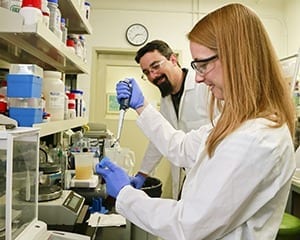
Could boost the yield of economically important varieties such as wheat, cotton, tomato and cucumber by 10% to 15%
Uzbek microbiologist Dilfuza Egamberdieva, group leader at the National University of Uzbekistan, at Tashkent, has isolated salt-tolerant bacterial strains that live in salt-degraded soils, where they help the rooting process in plants. After the selection of potentially root-colonizing bacteria, she has tested them in experimental settings on plants’ roots, obtaining 10-15% yields increase. She hopes to apply her technique soon, in Uzbekistan, to boost the yield of economically important varieties such as wheat, cotton, tomato and cucumber.
Egamberdieva has been invited to present her results at the TWAS’s 24th General Meeting in Buenos Aires, where she has been awarded one of the TWAS Prizes that carries a cash award of US$15,000.
TWAS, The World Academy of Sciences for the advancement of science in developing countries, headquartered in Trieste, Italy, was founded by Pakistani physicist Abdus Salam. This year the Academy celebrates its 30th anniversary at its conference in Buenos Aires.
More than 2.6 billion people in the world rely on agriculture, but around 52% of the land used for this scope shows soil degradation. Land impoverishment is often due to salt infiltrations in the ground, which weaken the plants and lower the yield. Salt inhibits “nodulation”, the development of tiny nodules on plants’ roots, where nitrogen fixation occurs. Nitrogen is a critical element limiting plant growth, and specific bacteria convert the atmospheric nitrogen absorbed by plants into a more usable form (ammonia).
Uzbekistan has 4,4 million hectares to use for agricultural purposes, but more than half are under-productive, due to excessive saline content from the Aral Sea basin.
Egamberdieva has been studying soil bacterial communities for more than 10 years. She has noticed that salty soils discourage bacterial growth, and stress plants at the same time. In addition, as she has repeatedly proven, salty soils often host bacteria that are noxious for humans.
In her investigation, Egamberdieva has spotted beneficial soil salt-resistant bacteria that help plants grow better, causing no harm to men. These bacteria are found around the roots of plants. “We found that bacteria from the Pseudomonas family, in particular Pseudomonas extremorientalis, are salt-resistant and grow close to the roots, where they compete with other bacteria for colonization. On the contrary, pathogenic bacteria cannot actively colonize the plants’ roots. Here, Pseudomonas produce antibiotics that plants use to defend themselves against fungi, trigger the rooting process and produce nodulation-promoting factors, thus giving the vegetation better chances to fix nitrogen and grow bigger”. As an exchange for these favours, plants secrete exudates useful for the bacteria.
To better exploit these useful bacterial strains, the Uzbek microbiologist has come up with a technique that allows the selective enrichment of Pseudomonas strains. Using her technique, which has already been patented, Egamberdieva is able to isolate from the soil only beneficial root-stimulating bacteria.
The Latest Bing News on:
Salt-degraded soils
- Norwich company to help solve world hunger by growing rice on ocean surfaceson April 29, 2024 at 8:32 pm
‘Ending world hunger, achieving food security and improved nutrition, and promoting sustainable agriculture’ is the United Nations’ number two goal. And it’s one that a company based at Norwich ...
- They turned cattle ranches into tropical forest — then climate change hiton April 27, 2024 at 10:11 am
The problem is sometimes called the human-grass-fire cycle: when invasive grasses, often introduced through agriculture, crowd out forests and then dry out and become fuel, making the landscape more ...
- Scientists are growing crops with salt water that could help save us from starvationon March 30, 2024 at 4:52 am
"How do we grow more on lands that are becoming degraded? This was the main ... like saltier soils and warmer temperatures. Salt naturally occurs in soils everywhere, but too much of it can ...
- Laibin Huang, Ph.D.on March 13, 2024 at 6:53 am
Soil Biology and Biochemistry ... Carbon-rich substrates altered microbial communities with indication of carbon metabolism functional shifting in a degraded salt marsh of the Yellow River Delta, ...
- Drainage in Agriculture: controlling water and salt levels in the soilon January 12, 2023 at 4:40 pm
You will learn how to create a perfect soil profile for optimal growing conditions for a crop and help feed the growing world population. Enroll now and prepare for the effects of climate change ...
- Restoration of Estuarieson April 23, 2022 at 8:27 am
Typically, spatially localized tracts of salt marsh vegetation are restored in degraded areas ... geomorphological, and soil characteristics of the salt marsh habitat are highly variable and ...
- Why soil matters (and what we can do to save it)on December 12, 2021 at 11:52 am
Similarly, the age-old practice of irrigation, when overdone, increases the volume of salt in the soil ... can maintain soil quality and even restore degraded soil to good health.
- Nature’s ticking time bomb?on December 10, 2020 at 2:00 am
Around 80% of that land has been degraded by activities including heavy grazing and draining the soil for agriculture and forestry. But the Peatland ACTION project is working to restore it.
- Welcome to the Hoagland Soil Microbial Ecology Labon January 11, 2019 at 8:08 am
However, to achieve these goals, farmers must deal with soils that are degraded and potentially contaminated ... by pathogens and abiotic stress caused by heavy metals, drought, salt and heat. New ...
The Latest Google Headlines on:
Salt-degraded soils
[google_news title=”” keyword=”Salt-degraded soils” num_posts=”10″ blurb_length=”0″ show_thumb=”left”]
The Latest Bing News on:
Soil degradation
- African Union and Government of Kenya Sign Host Agreement for the Africa Fertilizer and Soil Health Summiton April 30, 2024 at 8:56 am
The African Union Commission and Government of the Republic of Kenya signed a host- agreement ahead of the Africa Fertilizer and Soil Health Summit to be held in Nairobi Kenya from 7 to 9 May 2024.
- A Match Made in MAGA: How a Friendship Helped J.D. Vance Land on Trump’s V.P. Liston April 27, 2024 at 2:01 am
The Ohio senator and Donald Trump Jr. have bonded politically and personally. It’s a relationship that could factor into the former president’s search for a running mate.
- Nature degradation could cause a 12% loss to UK GDP, new analysis suggestson April 25, 2024 at 2:05 pm
The deterioration of the UK's natural environment could lead to an estimated 12% loss to GDP, according to new analysis. In comparison, the financial crisis of 2008 took around 5% off the value of the ...
- Environmentalists suggest ways to tackle land degradation, desertification in Nigeria’s 11 frontline stateson April 25, 2024 at 7:10 am
The environmentalists said Nigeria’s 11 frontline states affected by land degradation and desertification "constitute about 35 per cent of Nigeria's total land area." ...
- Nature degradation could cause 12% loss to UK GDP in coming years, analysis showson April 25, 2024 at 3:27 am
The first-of-its-kind analysis found that nature-related risks were as detrimental, if not more, to the economy as those from climate risks ...
- Govt mulls ban on concrete tombs to optimize landon April 24, 2024 at 4:51 pm
A proposed law amendment seeks to ban burying the dead in tombs built with cement and tiles to address delays in land reuse, according to the Ministry of Local Government (MINALOC). It argues that ...
- noco-noco Collaborates with Binex to Develop Agriculture Based, Soil Sequestered Carbon into Creditson April 24, 2024 at 8:00 am
SINGAPORE and TOKYO, April 24, 2024 (GLOBE NEWSWIRE) -- noco-noco Inc. (NASDAQ: NCNC), (“noco-noco”), signed a Memorandum of Understanding with ...
- Gujarat high court asks PCB to pay farmer Rs 20 lakh for its inaction that led to land degradationon April 23, 2024 at 1:08 pm
AHMEDABAD: The Gujarat high court has ordered Gujarat Pollution Control Board (GPCB) to pay a compensation of Rs 20 lakh to a farmer in Devbhoomi Dwar.
- Leading the Charge Against Climate Change: World's Largest Green Olivine Mineral Reserve Cleansing Land, Air, and Wateron April 22, 2024 at 3:16 pm
Climate change casts a shadow over billions worldwide, as natural disasters, environmental degradation, and erratic weather patterns disrupt crops, deplete food sources, devastate fisheries, and ...
- New Rule Will Change the Way the Federal Government Manages 245 Million Acres of Public Landon April 22, 2024 at 11:01 am
A BLM rule change will put conservation on a level playing field with other land uses like mining, grazing, and energy development.
The Latest Google Headlines on:
Soil degradation
[google_news title=”” keyword=”soil degradation” num_posts=”10″ blurb_length=”0″ show_thumb=”left”]









